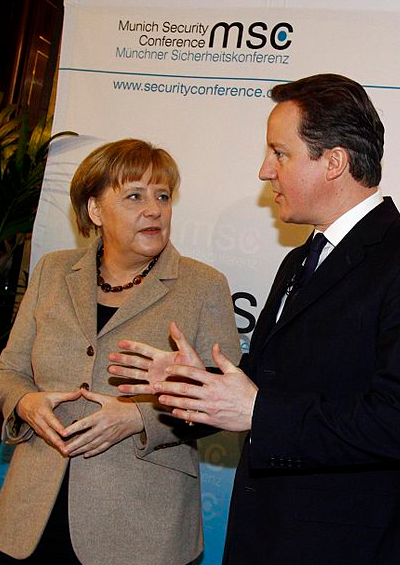Germany-UK: Making Up for a Lost Century
Britain and Germany must recognize at long last they have a common future.
May 12, 2015

Last week the United States and much of the world — including a peaceful, democratic Germany — celebrated the 70th anniversary of VE day. Ironically, on the same day, we were treated to the results of a British election that may exacerbate relations, yet again, between the only two great powers in Europe that could set things right after a lost century of misunderstanding.
The true tragedy is that Britain and Germany could have done the same thing 100 years ago, had each country understood the critical centrality of their relationship on the continent.
Alternative history
Reimagine the contours of European and world history (as well as the detours that could have been avoided) if there had been no falling out between Germany and the UK in the run-up to World War I.
First and foremost, Hitler’s rise, in all likelihood, would not have happened. The devastation of World War II would not have occurred. The same goes for the extermination of the Jews from much of Europe.
Yes, there would have probably been competition with the Soviet Union, but that would have resolved itself favorably through containment and self-attrition. And it might even have ended faster, without the false ideological and morale-boosting high that World War II brought to Russia, despite all the hardships.
And the cumbersome process of structuring a European Union would not have required the pains and tragedies of a birth, quite literally, out of the ashes of a destroyed continent. What unites the United Kingdom and Germany at the core is their mutual embrace of enlightened liberal commercial internationalism.
Today, both the German and the British governments are on a similar path. They are focused on fiscal consolidation and promoting longer-term productivity. They are both open to trade, deemphasize defense, while seeking to advance fairness, accountability and incentives throughout society.
A missed opportunity
If these two countries had been joined at the hip far earlier, and not Germany and France — which sees the world in a different way than London and Berlin — then European integration could have got its start decades before 1956.
And the path ahead today would seem more straight-forward. David Cameron’s surprisingly resounding reelection victory should provide a welcome opportunity to re-dynamize the EU, by developing a stronger German-British motor.
What would this motor yield? Less bureaucracy, more targeted funding, better budget controls, fewer pipedreams, more real integration (including on the defense industry), an enhanced sense of economic realism. All of these are important attributes for a stronger European Union.
What the world will be treated to instead, largely for reasons of Britain’s prolonged search for its national identity, is a very narrow-minded, Little Englander-type debate on whether the British Isles should say “sayonara” to Brussels and the EU.
This is the same head-in-the-sand debate that has clouded Britain’s role in Europe repeatedly over the past half-century. British Conservatives’ non-modernist and sovereigntist instincts being what they are, they’d rather delude themselves in embracing a hollow notion of “independence” than seize opportunities to get their country ahead through an ever closer partnering with Germany.
Kindred spirits
At the most basic level, a close relationship between Germany and the United Kingdom seems entirely natural. That holds true all the more so in view of many decades of stressing the Franco-German friendship. Enshrined as it is in a treaty dating back to 1963, that bilateral relationship has remained rather artificial to this very day, despite solid efforts on both sides.
France’s inability to restructure its economy and embrace global challenges has the German government worried. In an ideal world, Angela Merkel would like to work up a credible alternative, so that Europe’s progress does not get stuck in the morass of French domestic politics.
Broadly speaking, Cameron could offer that alternative. There is no doubt that on the German chancellor’s ideological roadmap, the reelected British prime minister on a personal level appears to be a far more reliable, likable partner than either Messrs. Sarkozy or Hollande, who both seem to be quite inscrutable to her.
Indeed, given Germany’s and the UK’s very different paths in the first half of the 20th century, it can seem rather bewildering that today Germans and Britons are more or less pulling on the same rope—and in the same direction. Isn’t that what Americans and Brits are supposed to do, while the Germans “hang out” with the French?
Historical precedent
Well, yes — but things used to be very different. Even though it now seems buried in the dark zones of memory, Germans and Britons were once a mutual admiration society. Just look back to modern Europe’s formative period, the last quarter of the 19th century and the first decade of the 20th century.
Back then, it notably was France and Germany that were the “arch enemies.” These days, the memory of better British-German ties is, quite cynically, only communicated as an affinity between Prussian kings and the House of Windsor, with its German roots.
Yes, there was the pesky matter of naval competition in the run-up to WWI. The Germans admired the British for Britannia’s ability to rule the seas, which greatly helped it generate economic wealth. Little wonder that the Germans wanted to build a navy, too.
Unfortunately, Germany at the time was led by a vain, mostly pomp and status-seeking Emperor, Wilhelm II. Under those circumstances, the naval competition turned into a zero-sum game that was ardently pursued by both sides. Whatever Germany gained in power was seen as coming directly at the expense of Britain’s power.
The German leadership, small minds no doubt, did not understand that they had already “won.” German production and export statistics were improving dramatically, outperforming the UK’s. Simply put, the German royal-military complex simply focused on the wrong statistics.
Rewriting history
The really important battle wasn’t about the tonnage of war ships. Whatever the precise details at the time, a German-British arch rivalry is something that, in part, was hoisted upon a German leadership that had not yet understood how the global game was played.
It looked at competition in very narrow, cross-border terms and focused on military assets. Thus, the special relationship between the United States and the UK was born. Hard though it is to imagine from today’s vantage point, back then that was by no means the natural course of things to come.
To both British and German industrial interests, the Americans were the ragged upstarts—and very much the common irritants. They were viewed in London and Berlin as a somewhat unrefined, even brutish conglomerate of peoples drawn together without much forethought from all over the globe.
And they were, of course, quite eager to find their own place in the sun. That narrative, no doubt, is very different from the one the entire post-World War II generation grew up with.
Under the terms of the history that most people learned, there was a natural affinity between Americans and Brits, while it was the Germans who were the more or less seen as the common irritants.
The U.S.-UK relationship
That constitutes a surprising turn of events, especially considering that the origins of the United States of America was a painful process of dissolution from the British crown. Remember 1814, when British forces went marauding through the fledgling United States once more, and tried to stomp out the upstart? By 1914, all that was forgotten.
The United States and United Kingdom had made nice and soon after made common cause against Germany. The narrative developed for the occasion, that World War I was the “fault” of the Germans, has since been disproven, including by prominent American and British historians.
With the benefit of hindsight, it is much safer to say that there were small groups active, including in British leadership circles, that fancied an interest in war-mongering and guilt-tripping.
Wiser counsel than that provided by the likes of the hot-tempered Winston Churchill or Germany’s Wilhelm II would have been needed to cool everybody’s temperature. But it was not to be.
Soon enough, the enmity narrative cast its dark shadows over German-British relations, “Huns” and all. British newspapers are still not free of that mindset today. Despite all that, what are the prospects for much improved British-German relations?
Quiet acceptance
When one quizzes leading thinkers in London’s smartest clubs about this question, there is a shock-and-awe moment. With an invariably hushed voice, they will now say things like: “Well, actually, for the first time ever that I can recall, we have been admitting to ourselves that there are some things the Germans are doing remarkably well. There are certain things we could learn from them.”
One can only wish that such hesitant admissions would be given more breathing space. For no matter how one looks at Europe today, one thing is for sure. The fact that the UK and Germany have basically led parallel lives for the past century has not been helpful for anybody.
Worse, the deliberately managed effort to bring about separation between Germany and the United Kingdom triggered what, from today’s perspective, can only be called 100 years of profound imbalance in Europe. Yes, much of it was triggered and/or instigated by a Germany that had been thrown off course after World War I.
That Germany, though, was a very new, inexperienced nation. World War I came just over three decades after its founding. So it was a bit of an amateur.
A chance for redemption
Eventually though, after decades of rethinking their act and overhauling their values and procedures, the Germans — by around the 1970s — were back on the path of virtue. Coincidence or not, Britain now finds itself in a similar position to rethink its national act.
The old levers of power — “the City” (meaning finance and big banks) will lift us, and so will big oil — are no longer the certainty they used to be. To rally the troops, David Cameron offered his party followers some red meat – a vote of renegotiating EU membership.
That move may have had the desired effect of calming the Conservative tempers somewhat. But in the bigger scheme of things, other things matter far more. And none is bigger than a rapprochement of Germans and Britons, supposing (and hoping) that really comes about.
It would end a destructive cycle of European history: the unnecessary enmity and distrust between Germany and the United Kingdom. If that happened, the economic and political core of the European Union would be greatly strengthened.
Editor’s Note: This article is adapted from “Will David Cameron only deepen Europe’s tragedy?” published on Politico.
Takeaways
The UK and Germany wasted a century bickering. Time for Cameron to see the critical importance of their relationship.
If the UK and Germany had had a strong relationship earlier, European integration would have started before 1956.
The gulf between the UK and Germany has created 100 years of profound imbalance in Europe.
Appeasing Conservatives with a Brexit vote is far less important than mending Britain’s relationship with Germany.
The Conservative victory in the UK could be disastrous for Europe. But there is a chance Cameron could set it right.

